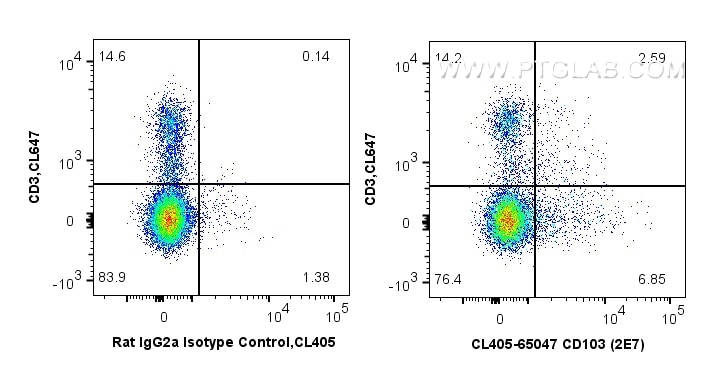CD103 Monoklonaler Antikörper
CD103 Monoklonal Antikörper für FC
Wirt / Isotyp
hamster / IgG
Getestete Reaktivität
Maus
Anwendung
FC
Konjugation
CoraLite® Plus 405 Fluorescent Dye
CloneNo.
2E7
Kat-Nr. : CL405-65047
Synonyme
Galerie der Validierungsdaten
Geprüfte Anwendungen
| Erfolgreiche Detektion in FC | Maus-Splenozyten |
Empfohlene Verdünnung
| Anwendung | Verdünnung |
|---|---|
| This reagent has been tested for flow cytometric analysis. It is recommended that this reagent should be titrated in each testing system to obtain optimal results. | |
| Sample-dependent, check data in validation data gallery | |
Produktinformation
CL405-65047 bindet in FC CD103 und zeigt Reaktivität mit Maus
| Getestete Reaktivität | Maus |
| Wirt / Isotyp | hamster / IgG |
| Klonalität | Monoklonal |
| Typ | Antikörper |
| Immunogen | C57BL/6J Maus Intraepitheliale Lymphozyten (IEL) |
| Vollständiger Name | integrin alpha E, epithelial-associated |
| GenBank-Zugangsnummer | BC150690 |
| Gene symbol | Itgae |
| Gene ID (NCBI) | 16407 |
| Konjugation | CoraLite® Plus 405 Fluorescent Dye |
| Excitation/Emission maxima wavelengths | 399 nm / 422 nm |
| Form | Liquid |
| Reinigungsmethode | Affinitätsreinigung |
| Lagerungspuffer | PBS with 0.09% sodium azide. |
| Lagerungsbedingungen | Store at 2-8°C. Avoid exposure to light. Stable for one year after shipment. |
Hintergrundinformationen
CD103, also known as integrin alpha-E (ITGAE) or integrin alpha-IEL, is a type I transmembrane integrin protein that binds integrin beta 7 to form Integrin alpha-E beta-7 which is a receptor for E-cadherin and mediates adhesion of T lymphocytes to epithelial cells (PMID: 7969453; 8468482). CD103 is expressed on intraepithelial lymphocyte (IEL) T cells (both alpha/beta T cells and gamma/delta T cells), some peripheral regulatory T cells (Tregs), lamina propria T cells, and a subset of dendritic cells in the gut mucosa and mesenteric lymph nodes (PMID: 12242333; 15608520; 16216890).
Protokolle
| Produktspezifische Protokolle | |
|---|---|
| FC protocol for CL Plus 405 CD103 antibody CL405-65047 | Protokoll herunterladen |
| Standard-Protokolle | |
|---|---|
| Klicken Sie hier, um unsere Standardprotokolle anzuzeigen |


